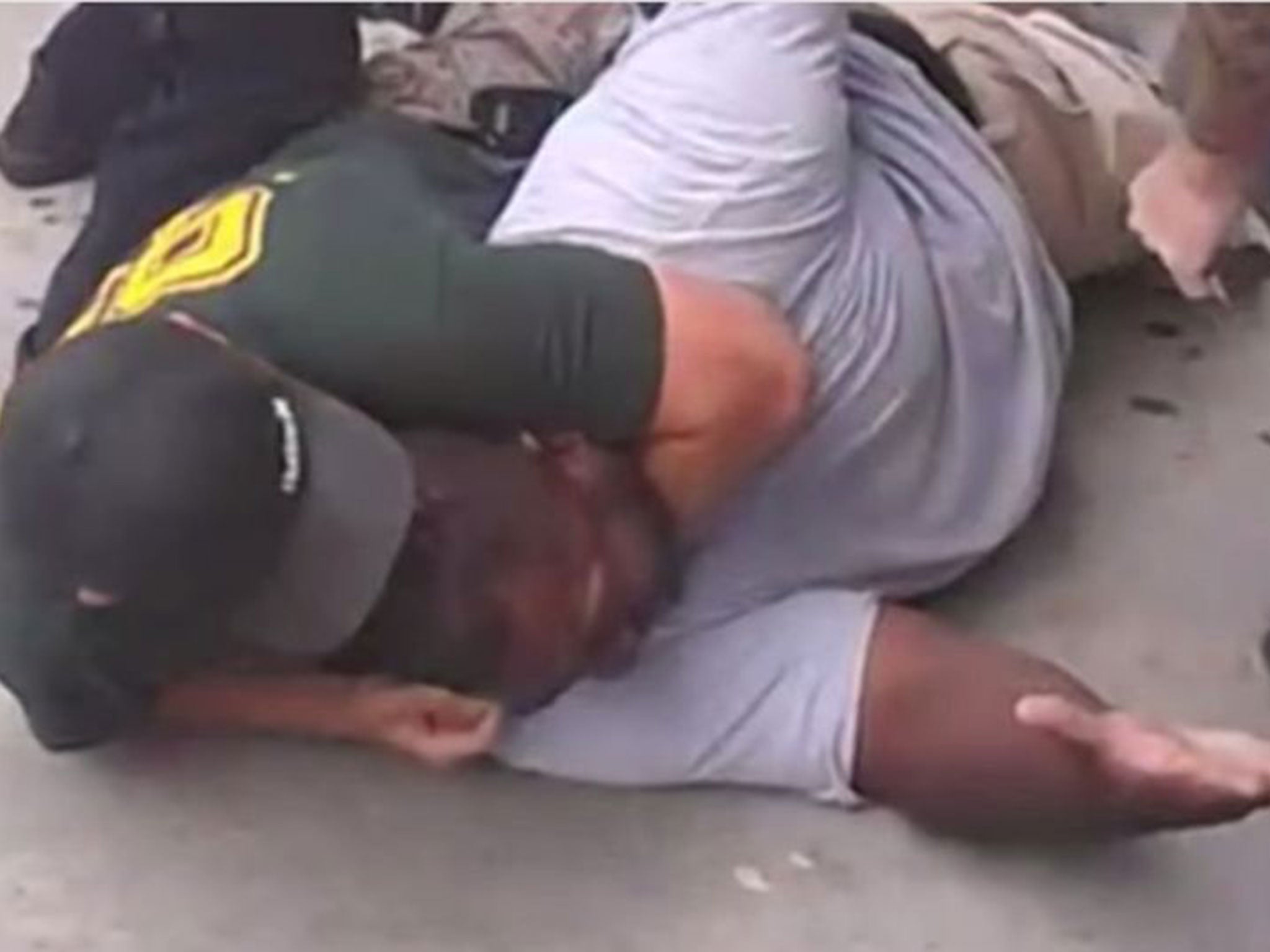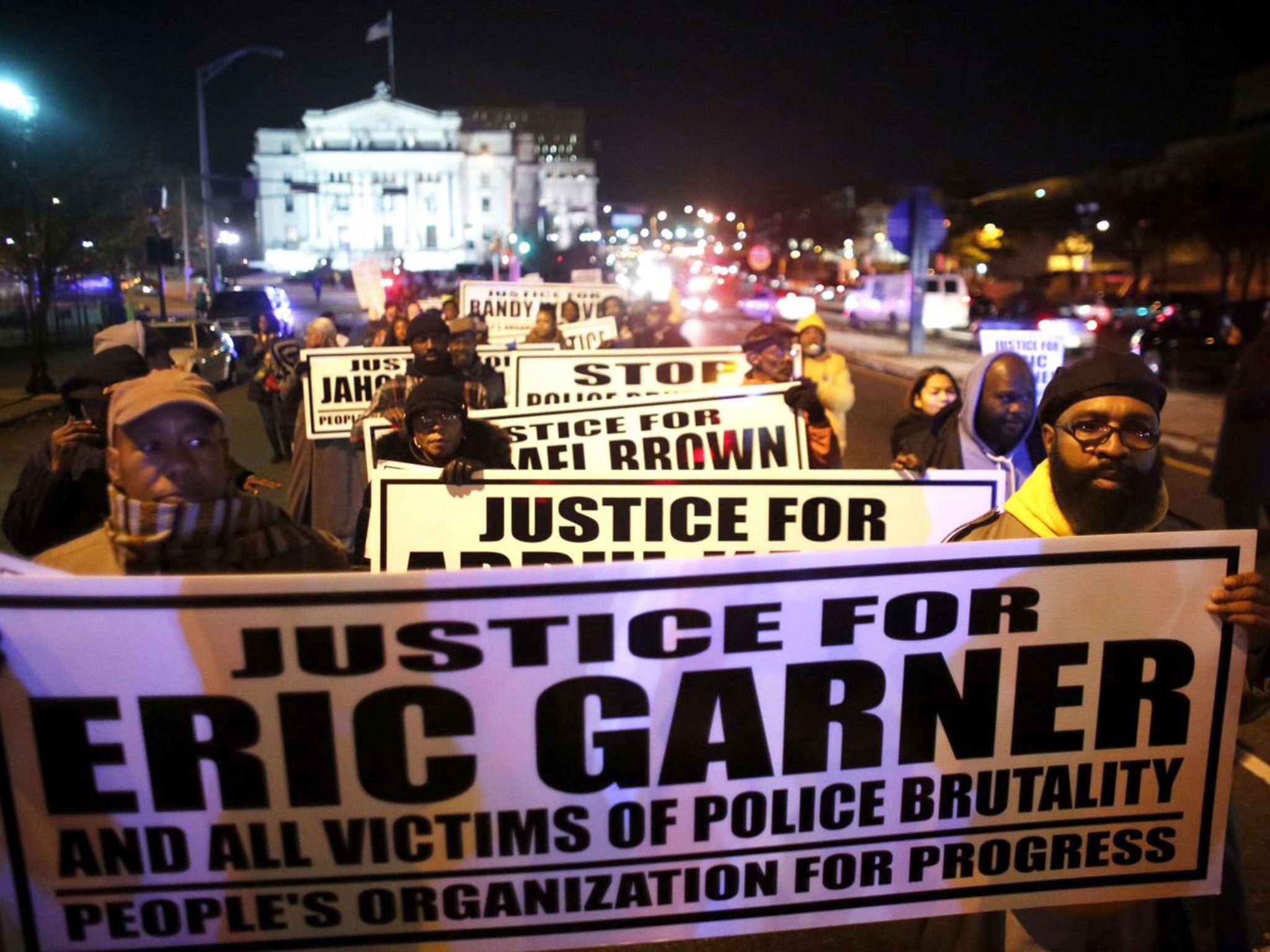Eric Garner 'chokehold' death: A grand jury blind to the evidence before it
Out of America: The decision not to bring charges after the death of a black man in police custody suggests a fatal flaw in the system

At least Eric Garner has his epitaph. "I can't breathe," he gasped as he was forced to the ground and held by a New York police officer in the chokehold that caused his death. The phrase now serves not only as a chant by demonstrators in cities across the land. It will go down as history's shorthand for the persecution of black suspects by law enforcement and the judicial system across the US that seems virtually routine.
Anyone – not just black people sick and tired of racist victimisation by police – who has watched the video of Garner, father of six and 43 years old, being wrestled to the ground as if he'd just committed a murder, will be astonished that a grand jury declined to bring any charges against the officer last week – even though the medical examiner at Garner's autopsy ruled that the death was a homicide.
In fact, Garner, overweight and asthmatic, was suspected of selling loose blackmarket cigarettes ("loosies" as they are known in the trade). Given that taxes have pushed up the price of a packet of 20 to around $12 (£8) in New York City, such petty offences are understandably commonplace. But by any standard the police action was absurdly disproportionate.

The video shows not a man resisting arrest, but one wearily complaining about what he sees as harassment. It shows him then being placed in a chokehold – a procedure officially banned for police because it is so dangerous – and hurled to the ground. He was pinned down, his face forced against the pavement, amid desperate repeated pleas: "I can't breathe… I can't breathe." As he lay inanimate, the police stood around waiting for the emergency medical team to arrive, a few minutes later. No one apparently thought to apply CPR.
Once such incident is bad enough. That the grand jury's refusal to indict came just 10 days after the similar decision of the grand jury in Ferguson, Missouri, exonerating the police officer who shot dead another unarmed black suspect, Michael Brown, was simply too much. Protests involving whites as well as blacks erupted in New York, Washington and elsewhere. Mercifully, in contrast to the rioting which engulfed Ferguson, they have at the time of writing been non-violent.
The attempted arrest may be explained by the established, and in some respects successful, New York police doctrine of "broken windows" – that criminal activity is a "continuum", to use the expression of the city's police chief, Bill Bratton. By clamping down on petty crime, the theory goes, you reduce more serious offences too. To be fair, serious crime has dropped substantially in New York. But then again, so it has in most big US cities in the past two decades, even in those which did not espouse the doctrine.
"Broken windows", however, bears down perforce on poorer neighbourhoods where black people and other minorities tend to live. As such, it all too easily reinforces the perception that America's police and criminal justice system is white-run and unfairly discriminates against black people.
The perception is well-founded. The evidence of bias is overwhelming. Why are so many more black than white people, proportionate to their share of the population, in jail? Why are black-on-white crimes more severely punished than white-on-black? And would the incidents in Staten Island and Ferguson have happened if a white suspect had behaved in a similar way? It's hard to believe, to put it mildly.
But other, even more basic, questions arise. Why in such cases do the police almost always get a free pass: how could that New York grand jury see the video and not press charges? As Groucho Marx said, who are you going to believe: me, or your own eyes? In other words, might there be some flaw in the grand jury system itself?

Britain has the Crown Prosecution Service, France its juges d'instruction, Italy its investigating magistrates, but America is practically the only country to use grand juries. Ironically, the institution was imported from Britain with the first colonists, a descendant of a long tradition dating back to the Magna Carta whereby a panel of knights and freemen investigated not just charges brought by the authorities of the day, but accusations – of corruption, malpractice, injustice – levelled by ordinary citizens against those in power.
Britain has long since dropped grand juries, but in the US they survived for that same original purpose, in theory independent of each of the three branches of government, the ultimate of the checks and balances stipulated by the US constitution. Numbering up to 23 members, all of them ordinary citizens, a grand jury is grand in the French sense, distinct from the petit jury of 12 jurors serving at trials proper.
But over time, the role of American grand juries has changed. Their ability to investigate citizens' complaints has in practice disappeared. Instead, they now decide whether a person should be indicted, or charged with an offence – and so have in effect become the instrument of prosecutors, the abuse of whose powers they were once intended to prevent.
There is no judge. Proceedings, normally shrouded in total secrecy, are run by a prosecutor, and usually grand juries only hear the prosecution's side of the case. As a former chief judge of the New York Court of Appeals once put it, a prosecutor these days can get a grand jury "to indict a ham sandwich". Or not, as the case may be.
Why were the two police officers not indicted, even on the lesser count of involuntary manslaughter? Because, one suspects, it was not in the prosecutor's interest. Prosecutors work closely with local police. To bring a police officer to court is, in a sense, to bite the hand that feeds them. Invariably, the officer gets the benefit of the doubt. In the Staten Island case, however, the notion of "doubt" strains credulity to breaking point. The result is a cauldron of racial resentment poised to boil over.

Join our commenting forum
Join thought-provoking conversations, follow other Independent readers and see their replies